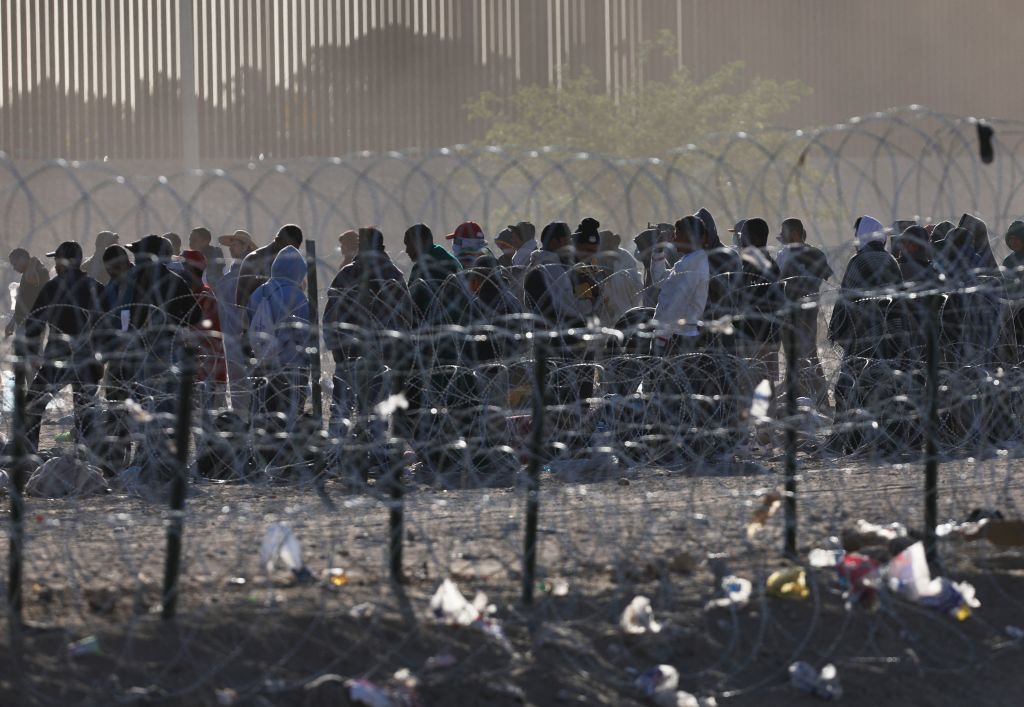During a summer break, The Interpreter will feature selected articles each day from throughout the past year. Normal publishing will resume 15 January, 2024. This article first appeared on 23 May, 2023.
Sometimes it is the drip-drip effect of frequent, small exposures, that gradually accumulate over time and result in a conversion. On an almost daily basis, countries around the world are announcing and executing plans to exclude asylum seekers. Here is the endgame for the international consensus to uphold asylum and protect those who need it.
The United Kingdom, amid a cost-of-living crisis and crippling national strikes, is pushing ahead with its plan to deport asylum seekers to Rwanda. That the policy is unlikely to work should not distract from its intention.
Germany, meantime, is considering new partnerships to process asylum seekers in their countries of origin, manifestly untenable for people in fear of persecution by their own government. Lithuania is preparing a policy for the collective expulsion of asylum seekers. Dozens of asylum seekers have drowned leaving Tunisia for Europe in recent weeks, while the Greek government has been accused of rounding up asylum seekers and abandoning them on a raft in the sea. The United States and Canada have agreed a deal to turn back asylum seekers at their border, a policy expected by some experts to create an incentive for human smuggling. Increasing numbers of Rohingya are departing camps in Bangladesh to escape the prospect of being forcibly returned to Myanmar, and with dwindling hopes for resettlement in countries like Australia.
The list goes on.
Without question such policies diminish the rights of asylum seekers – including those with a genuine claim on refugee status. In some cases, these policies are in breach of the 1951 Refugee Convention, and subject to legal challenge; all are a retreat from accepted norms, including access to the territory of other states, economic and social rights, and durable solutions.
But “firm opposition” by the UN Refugee Agency and shrill denouncements by human rights organisations make no difference. Such criticisms also ignore legitimate concerns about the 1951 Convention by states obliged to consider any application for asylum made on their territory, however ill-founded the application may be, even if the applicants enter without authorisation, and faced with rising numbers.
This retreat from asylum principles is not new, indeed it could be argued to have begun with the so-called “Pacific Solution” adopted by Australia over 20 years ago to send asylum seekers to island nations in the region, a policy which the UK is largely mimicking today. But norm-busting is now becoming the norm, and rather than being perceived as pariahs, the states enacting these policies are now considered by others proactive.

Does Ukraine buck the trend? More than 7 million Ukrainians have been largely welcomed in other European countries, and while this generosity may have its limits, for now it endures, albeit with pressure relieved by significant numbers returning home. But comparisons with the European response to the massive influx of Syrians in 2015, many of whom remain stranded in makeshift camps in Greece (or set adrift on rafts in the Aegean Sea), suggest that the experience for Ukrainians is an exception. And in its exceptionalism, it conforms to the trend away from other accepted norms, that asylum should be a non-political act, and be applied consistently. The enemy of my enemy is my friend when they are Ukrainians, and not, it seems, when they are Syrians.
Australia called time on the asylum consensus 20 years ago, and perhaps now can help define a new consensus. There is a narrow view that the “national interest” is now paramount, whatever the implications for asylum seekers, and irrespective of international law and human rights. But a wider view in Australia sees these interests complemented by robust refugee resettlement programs and expanded legal channels for migration. But the experience of Sudan, where the United Kingdom recently ruled out introducing safe routes for asylum seekers, suggests that a new international consensus is a long way from being forged. The challenge for the future is to adopt policies such as extending visa schemes to people forced from their homes, including by the effects of climate change, as well as concerted efforts to address migrant smuggling and human trafficking.
It should not be left to catastrophe to remind the world of our common humanity.

